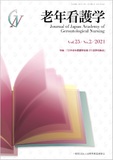Japanese
English
- 販売していません
- Abstract 文献概要
- 参考文献 Reference
抄録
下肢閉塞性動脈硬化症のバイパス手術後の高齢夫婦二人暮らしの日常生活体験を明らかにすることを目的とした.夫婦二人暮らしの3組に半構成的面接を行い,質的統合法(KJ法)により分析した.患者は[将来に備えた生活基盤の構築]を支えに,[暮らしのなかで感じる手術の効果]を得,同時に[自己決定による手術後の足を守る行動]をとっていた.一方で[将来への不安]を抱えていた.配偶者は[手術後の患者に対する肯定的な思い]を抱き,[ライフスタイルの転換]と[自分なりの健康管理]を基盤に[家庭生活の維持]をする一方で,患者同様[将来への憂い]を抱えていた.
患者は,配偶者の協力を得ながら,けが予防,下肢の保護,定期受診,服薬管理,症状の観察という自分が生活するうえで実施可能なことを選択し,病気の悪化を予防していた.しかし,必要なことすべてが実施できるわけではないため,生活者である患者の思いをとらえ,入院中から患者と共に実施可能性の高い健康管理方法を見いだす指導が重要である.
To investigate the daily life experience of elderly patients and their spouses living by themselves after bypass surgery for arteriosclerosis obliterans of the lower extremities, semi-structured interviews were conducted with three married couples, and the obtained data were analyzed using the Qualitative Synthesis method (KJ method). The patients realized [the effects of the surgery in daily life], and adopted [behaviors to protect their legs based on their decisions after surgery] being supported by [a foundation for future life], while they developed [anxiety about their future]. Their spouses [had a positive emotion toward the patient after surgery] and [maintained their household] by [changing their lifestyle] and [devising measures to manage their own health], while they had [concern about their future].
The patients adopted measures for deterioration prevention, which were feasible for them in daily life, such as preventing injury, protecting the lower extremities, regularly receiving medical consultation, managing medications, and observing symptoms, with cooperation from their spouses. However, as patients cannot implement all necessary measures, it may be important to understand their emotions from their perspectives on daily life, and determine feasible measures for health maintenance with them through guidance during hospitalization.
Copyright © 2021, Japan Academy of Gerontological Nursing All rights reserved.


